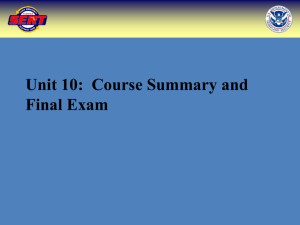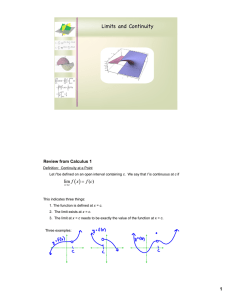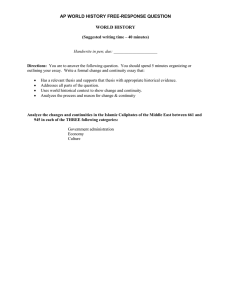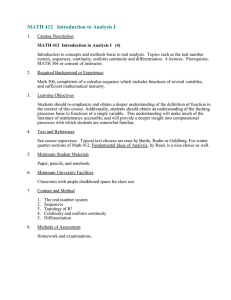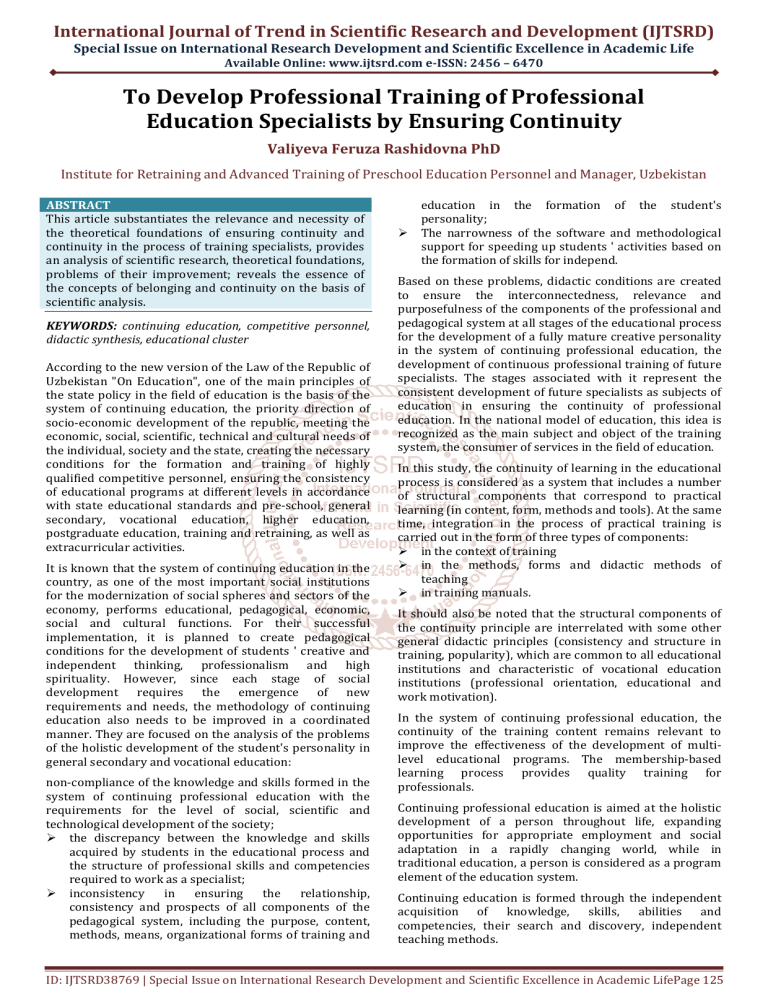
International Journal of Trend in Scientific Research and Development (IJTSRD)
Special Issue on International Research Development and Scientific Excellence in Academic Life
Available Online: www.ijtsrd.com e-ISSN: 2456 – 6470
To Develop Professional Training of Professional
Education Specialists by Ensuring Continuity
Valiyeva Feruza Rashidovna PhD
Institute for Retraining and Advanced Training of Preschool Education Personnel and Manager, Uzbekistan
ABSTRACT
This article substantiates the relevance and necessity of
the theoretical foundations of ensuring continuity and
continuity in the process of training specialists, provides
an analysis of scientific research, theoretical foundations,
problems of their improvement; reveals the essence of
the concepts of belonging and continuity on the basis of
scientific analysis.
KEYWORDS: continuing education, competitive personnel,
didactic synthesis, educational cluster
According to the new version of the Law of the Republic of
Uzbekistan "On Education", one of the main principles of
the state policy in the field of education is the basis of the
system of continuing education, the priority direction of
socio-economic development of the republic, meeting the
economic, social, scientific, technical and cultural needs of
the individual, society and the state, creating the necessary
conditions for the formation and training of highly
qualified competitive personnel, ensuring the consistency
of educational programs at different levels in accordance
with state educational standards and pre-school, general
secondary, vocational education, higher education,
postgraduate education, training and retraining, as well as
extracurricular activities.
It is known that the system of continuing education in the
country, as one of the most important social institutions
for the modernization of social spheres and sectors of the
economy, performs educational, pedagogical, economic,
social and cultural functions. For their successful
implementation, it is planned to create pedagogical
conditions for the development of students ' creative and
independent thinking, professionalism and high
spirituality. However, since each stage of social
development requires the emergence of new
requirements and needs, the methodology of continuing
education also needs to be improved in a coordinated
manner. They are focused on the analysis of the problems
of the holistic development of the student's personality in
general secondary and vocational education:
non-compliance of the knowledge and skills formed in the
system of continuing professional education with the
requirements for the level of social, scientific and
technological development of the society;
the discrepancy between the knowledge and skills
acquired by students in the educational process and
the structure of professional skills and competencies
required to work as a specialist;
inconsistency
in
ensuring
the
relationship,
consistency and prospects of all components of the
pedagogical system, including the purpose, content,
methods, means, organizational forms of training and
education in the formation of the student's
personality;
The narrowness of the software and methodological
support for speeding up students ' activities based on
the formation of skills for independ.
Based on these problems, didactic conditions are created
to ensure the interconnectedness, relevance and
purposefulness of the components of the professional and
pedagogical system at all stages of the educational process
for the development of a fully mature creative personality
in the system of continuing professional education, the
development of continuous professional training of future
specialists. The stages associated with it represent the
consistent development of future specialists as subjects of
education in ensuring the continuity of professional
education. In the national model of education, this idea is
recognized as the main subject and object of the training
system, the consumer of services in the field of education.
In this study, the continuity of learning in the educational
process is considered as a system that includes a number
of structural components that correspond to practical
learning (in content, form, methods and tools). At the same
time, integration in the process of practical training is
carried out in the form of three types of components:
in the context of training
in the methods, forms and didactic methods of
teaching
in training manuals.
It should also be noted that the structural components of
the continuity principle are interrelated with some other
general didactic principles (consistency and structure in
training, popularity), which are common to all educational
institutions and characteristic of vocational education
institutions (professional orientation, educational and
work motivation).
In the system of continuing professional education, the
continuity of the training content remains relevant to
improve the effectiveness of the development of multilevel educational programs. The membership-based
learning process provides quality training for
professionals.
Continuing professional education is aimed at the holistic
development of a person throughout life, expanding
opportunities for appropriate employment and social
adaptation in a rapidly changing world, while in
traditional education, a person is considered as a program
element of the education system.
Continuing education is formed through the independent
acquisition of knowledge, skills, abilities and
competencies, their search and discovery, independent
teaching methods.
ID: IJTSRD38769 | Special Issue on International Research Development and Scientific Excellence in Academic LifePage 125
International Journal of Trend in Scientific Research and Development (IJTSRD) @ www.ijtsrd.com eISSN: 2456-6470
Based on scientific analysis, it can be concluded that
membership is an interconnected system between all the
stages that arise on the basis of each stage of the learning
process and constitute its internal conditions.
The principle of "continuity" in education can be
considered in several different forms: by type of
education, stages, disciplines and topics. It should be noted
that continuous learning is an integrated learning system
that is based on a logical sequence and consists of stages
that develop from simple to complex and complement
each other.
The next level of integration of the content of education is
the level of didactic synthesis. This level of integration of
academic disciplines is based on one of them. At the same
time, each of the interacting objects retains its status and
conceptual basis. The level of didactic synthesis implies
not only the integration of subjects, but also the
procedural synthesis established by it, which implies, first
of all, the integration of forms of educational activity in
general education and professional science. The study of
interrelated educational material through integrated
didactic synthesis in the learning process, that is, the
assimilation of certain professional material occurs in the
process of its study in the general educational process.
One of the mechanisms for the development of vocational
education is a cluster approach based on interaction,
cooperation, and dialogue between stakeholders, i.e.
educational institutions, employers, government agencies,
and public organizations. One of the forms of cooperation
is the creation of educational clusters in the regions. The
need to address the cluster approach is determined by the
advantages of the cluster, which is an organizational form
of combining the efforts of stakeholders to improve the
effectiveness of the regional system of vocational
education (figure -1).
Identifying the principles of the cluster approach
Creating a mechanism of interaction that ensures the success of
the formation of specialist competencies
FORMATION OF PROFESSIONAL COMPETENCIES
OF SPECIALISTS ON THE BASIS OF ENSURING
THE CONTINUITY OF EDUCATION
1.
2.
3.
4.
GTS continuity
Continuity of curricula and programs
Ensuring interdisciplinary continuity
Continuity of didactic provision
PROFESSIONAL EDUCATION
HIGHER EDUCATION
PRODUCTION
Figure 1. Cluster approach in the formation of specialist competencies in the system of continuing education
An educational cluster is, on the one hand, a set of
interconnected professional educational institutions that
combine industry characteristics and partnership with
industrial enterprises; secondly, it is a means of learning,
mutual exchange of experience and self-determination,
located in an innovative, mainly horizontally connected
science-technology-business chain.
The cluster approach in vocational education is to
coordinate the needs of production and training programs.
Production associations form orders for the training of
highly qualified specialists in vocational education
institutions.
There are three organizational and pedagogical conditions
for multi-level professional training of future specialists in
the system of continuing professional education:
organizational and managerial (acceleration of training),
psychological and pedagogical (implementation of the
pedagogical principles of cultural studies), practical and
methodological
(control
of
educational
and
methodological work and control of the results of
educational and production activities) blocks.
We can conclude that the cluster approach to vocational
education is the formation of orders by production
associations for the training of highly qualified specialists
ID: IJTSRD38769 | Special Issue on International Research Development and Scientific Excellence in Academic LifePage 126
International Journal of Trend in Scientific Research and Development (IJTSRD) @ www.ijtsrd.com eISSN: 2456-6470
in vocational educational institutions by determining that
the needs of production and training programs are
coordinated, and all levels of vocational education are
interconnected and interactive.
REFERENCES
[1] Valieva F. R. Cluster tizimini shkuv-ishlab chikarish
mazhmualariga zhori etishning shziga khos
khususiyatlari. // "Halk ta'limi" ilmiy-metodik
journal
2018.
No.
4-son.
106-113-bet
www.xtjurnali.zn.uz
[2]
Kazan: Publishing house of the Kazan State
University, 2000. - 303 p.
[3]
Jonathan Salt and Ed Paisley Innovation Clusters
Create Competitive Communities. - Huff Post Social
News September 21, 2009.
[4]
D. RRakhmatullaeva«Teach future entrepreneurs to
manage in team» Journal European research. –USA,
2016:
№
8
(19).
https://cyberleninka.ru/article/n/teach-futureentrepreneurs-to-manage-in-team
Volov V. T. Fractal-cluster theory of management of
educational structures: monograph / V. T. Volov. -
ID: IJTSRD38769 | Special Issue on International Research Development and Scientific Excellence in Academic LifePage 127

